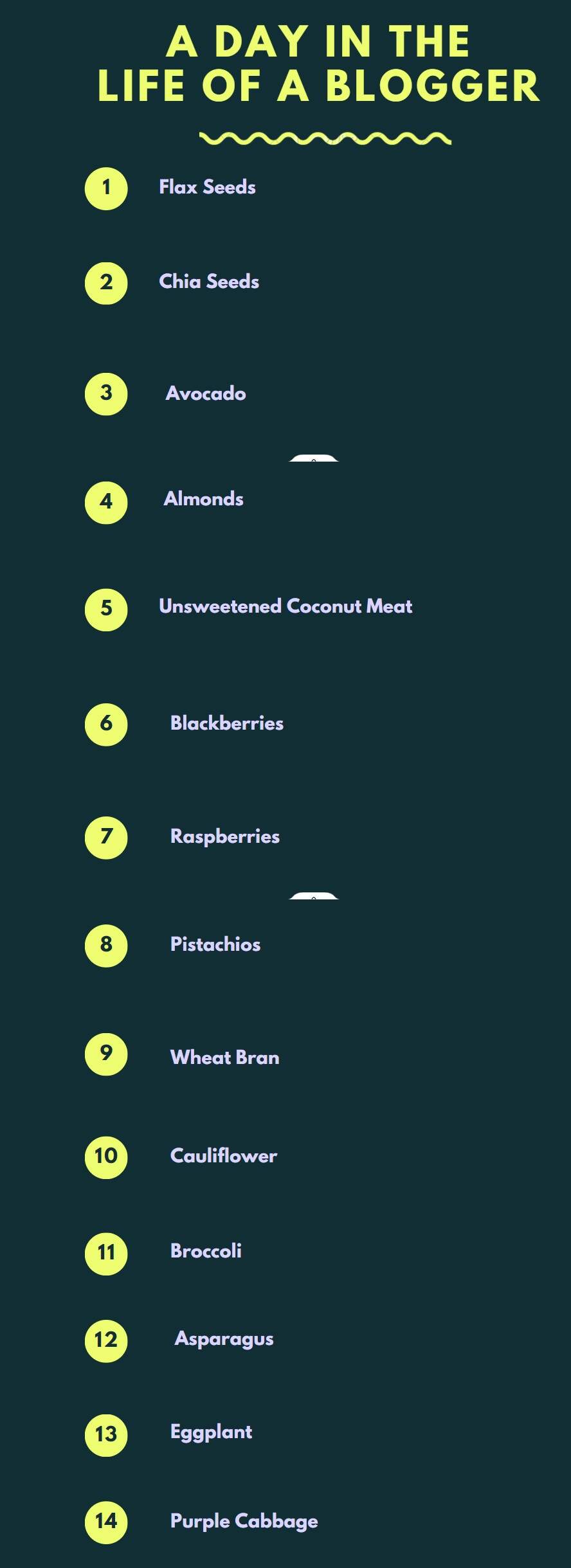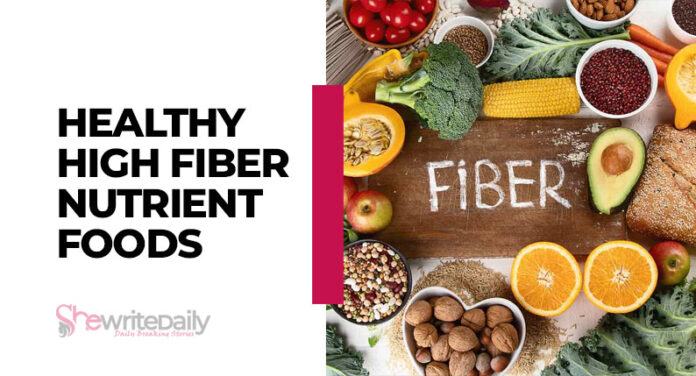Maintaining a healthy lifestyle is more important than ever in today’s fast-paced world. One crucial aspect of a healthy diet is consuming foods high in fiber and low in carbohydrates. These foods aid in weight management and offer various health benefits.
This article will explore 14 delicious and nutritious high-fiber, low-carb foods that can be easily incorporated into your daily diet. So let’s dive in and discover these fiber-rich wonders!
How Fiber Helps You Lose Weight?
Before we delve into the list of high-fiber, low-carb foods, let’s understand how fiber aids in weight loss. Fiber is an indigestible carbohydrate that adds bulk to our diet, making us feel fuller for longer periods. This reduced hunger and increased satiety can contribute to decreased calorie intake, thus supporting weight loss efforts. Additionally, high-fiber foods have fewer calories, allowing you to enjoy larger portions without consuming excessive energy.

1. Flax Seeds
Flax seeds are a tiny powerhouse of nutrition and an excellent source of dietary fiber. A tablespoon of flax seeds provides around 3 grams of fiber, making them an ideal addition to your diet. These nutty-flavored seeds are also rich in omega-3 fatty acids, which promote heart health and aid in weight control. Add flax seeds to your smoothies, sprinkle them over yogurt, or incorporate them into baked goods for a fiber and nutrient boost.
2. Chia Seeds
Chia seeds are another fantastic source of fiber, with one ounce containing a whopping 10 grams of fiber. These tiny black seeds are highly versatile and easily incorporated into various dishes. When exposed to liquid, chia seeds form a gel-like consistency, making them ideal for creating delicious and filling puddings. They can also be sprinkled on salads, added to smoothies, or used as an egg substitute in baking.
3. Avocado
Avocados are delicious and an excellent source of fiber and healthy fats. With approximately 10 grams of fiber per medium-sized fruit, avocados can help keep you full and satisfied. The monounsaturated fats found in avocados are heart-healthy and contribute to reducing LDL cholesterol levels. Incorporate avocados into your salads, sandwiches, or enjoy them as a creamy topping for your morning toast.
4. Almonds
Almonds are a satisfying and nutritious snack that provides good fiber. A one-ounce serving of almonds contains about 3 grams of fiber, healthy fats, protein, and essential vitamins and minerals. These crunchy nuts make a convenient on-the-go snack and can also be sprinkled on salads or added to homemade granola for an extra fiber boost.
5. Unsweetened Coconut Meat
Unsweetened coconut meat is a great addition to a high-fiber, low-carb diet. It contains around 10 grams of fiber per cup and is rich in healthy fats, including medium-chain triglycerides (MCTs), which can support fat metabolism. Enjoy fresh coconut meat as a snack, add it to smoothies, or incorporate it into your favorite recipes for a tropical twist.
6. Blackberries
Blackberries are not only delicious but also packed with fiber and antioxidants. One cup of blackberries contains around 8 grams of fiber and vitamin C. These antioxidant-rich fruits offer numerous health benefits, including supporting fat-burning and improving insulin sensitivity. Enjoy blackberries as a standalone snack, add them to your yogurt or oatmeal, or include them in your favorite desserts for a burst of flavor and fiber.
7. Raspberries
Similar to blackberries, raspberries are a fiber-rich and antioxidant-packed fruit. With approximately 8 grams of fiber per cup, raspberries are a great choice for those aiming to increase their fiber intake. These vibrant berries are also rich in vitamins, minerals, and plant compounds, promoting overall health and well-being. Enjoy raspberries in smoothies and salads, or savor them alone.
8. Pistachios
Pistachios are not only delicious but also a good source of both fiber and protein. A one-ounce serving of pistachios contains about 3 grams of fiber, making them a satisfying and nutritious snack option. These green gems also contain essential nutrients, including vitamin B6 and antioxidants. Incorporate pistachios into your diet as a standalone snack or use them to add crunch and flavor to salads or homemade trail mixes.
9. Wheat Bran
Wheat bran is a fiber powerhouse supporting digestive health and regular bowel movements. Just half a cup of wheat bran provides around 12 grams of fiber. This insoluble fiber adds bulk to the stool, aiding in proper bowel function and preventing constipation. Incorporate wheat bran into your baking recipes, sprinkle it on cereals or yogurt, or use it as a coating for chicken or fish for a fiber boost.
10. Cauliflower
Cauliflower is a versatile and low-carb vegetable that can substitute for high-carb ingredients. It contains approximately 2 grams of fiber per cup and essential vitamins and minerals. Cauliflower can be riced, mashed, or roasted to replace traditional high-carb options like rice or potatoes. Incorporate cauliflower into your meals to enjoy its fiber content while keeping your carbohydrate intake in check.
11. Broccoli
Broccoli is a nutrient-dense vegetable that is not only low in carbs but also high in fiber. With approximately 2.5 grams of fiber per cup, broccoli makes a valuable addition to a high-fiber, low-carb diet. It also contains essential nutrients, including vitamins C, K, and antioxidants. Enjoy broccoli steamed, roasted, or sautéed as a side dish, or incorporate it into stir-fries and salads for a nutritious and satisfying meal.
12. Asparagus
Asparagus is a delicious vegetable that is rich in fiber and nutrients. Asparagus can contribute to your daily fiber intake, with about 3 grams per cup. It is also a good source of copper, which plays a crucial role in enzyme function, and manganese, which supports bone health and metabolism. Enjoy asparagus steamed, grilled, or roasted as a side dish, or incorporate it into your favorite recipes for a tasty, fiber-packed meal.
13. Eggplant
Eggplant is a versatile vegetable that is not only low in carbs but also high in fiber. With approximately 3 grams of fiber per cup, eggplant can support digestive health and regular bowel movements. It is also rich in antioxidants, which help reduce inflammation and protect against certain types of cancer. Incorporate eggplant into your meals by grilling, roasting, or using it as a substitute for higher-carb ingredients in dishes like eggplant lasagna or ratatouille.
14. Purple Cabbage
Purple cabbage, also known as red cabbage, is a vibrant and nutritious vegetable that is both low in carbs and high in fiber. With approximately 2 grams of fiber per cup, purple cabbage can contribute to heart and bone health, reduce inflammation, and offer protection against certain types of cancer. This colorful vegetable is also rich in essential vitamins and minerals. Enjoy purple cabbage raw in salads, sautéed as a side dish, or fermented to make delicious and gut-friendly sauerkraut.
Conclusion
Incorporating high-fiber, low-carb foods into your diet can bring numerous health benefits, including improved weight management, blood pressure control, and blood sugar regulation. By adding flax seeds, chia seeds, avocados, almonds, unsweetened coconut meat, blackberries, raspberries, pistachios, wheat bran, cauliflower, broccoli, asparagus, eggplant, and purple cabbage to your meals, you can enjoy a diverse and delicious range of nutrient-dense foods while supporting your overall well-being.
Remember, maintaining a balanced and varied diet is key to reaping the full benefits of these high-fiber, low-carb foods. So experiment with these ingredients and discover new ways to incorporate them into your favorite dishes. Your body will thank you for it!
FAQs
Can high-fiber, low-carb foods help with weight loss?
Yes, high-fiber, low-carb foods can aid in weight loss by increasing satiety, reducing hunger, and supporting overall calorie control.
Are there any side effects of consuming high-fiber foods?
While fiber is generally beneficial, consuming excessive amounts without sufficient fluid intake may lead to bloating, gas, or constipation. It’s important to increase fiber intake and stay hydrated gradually.
Can these foods be part of a paleo or keto diet?
Many of the mentioned foods can be included in paleo and keto diets, although the carbohydrate content should be considered and portion sizes adjusted accordingly.
Can these foods be enjoyed on a vegan or vegetarian diet?
Absolutely! This high-fiber, low-carb foods suit vegan and vegetarian diets, providing nutrients without animal products.
Are there any precautions to take when adding these foods to my diet?
If you have any specific dietary concerns or health conditions, it’s always advisable to consult with a healthcare professional or registered dietitian before making significant changes to your diet. They can provide personalized recommendations based on your individual needs.


